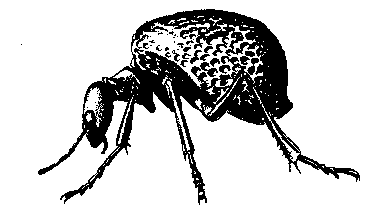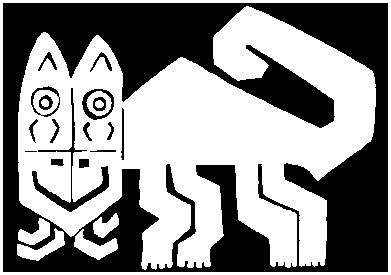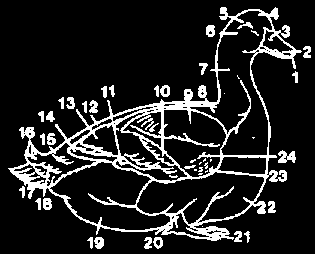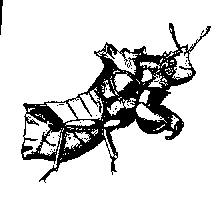Who Gives
Lunch to the
Bugs of India
The Bombay Pâñjrâpol occupies a whole quarter of the town and is separated into yards, squares, meadows and groves, with ponds, cages for beasts of prey, and enclosures for tame animals. This institution could well serve as a model for Noah's Ark. In the first yard, however, we saw no animals, but, instead, a few hundred living human skeletons --- old men, women and children. These were the surviving inhabitants of the so-called famine districts, who had crawled into Bombay to beg for bread. The fatherly government, having driven them out of their hovels for defaulting on their taxes, which are collected during a year of famine as well as of abundances made perfect its Christlike guardianship of the heathens, by finding room for them in a hospital for beasts.
But even the Pâñjrâpol roses are not without thorns. The herbivorous "subjects," of course, could not wish for anything better; but I doubt very much whether the carnivorous ones, such as tigers, hyenas, jackals and wolves, were entirely satisfied with the rules, and the forcibly prescribed diet. Jainas themselves do not eat flesh and turn away in disgust even from eggs and fish; in consequence, all the animals in their care are obliged to fast also. We were present at the feeding of an old tiger wounded by an English bullet. Having sniffed at a kind of rice soup offered him, he lashed his tail, snarled, showing his yellow teeth, and with a dull roar turned away from the unusual food, casting a look askance upon his keeper, who was meekly trying to persuade him to taste his dinner. Only the strong bars of the cage saved the Jaina from a vigorous protest on the part of this veteran of the forest. "What would you do," I asked, "if this snake over here were to crawl up to you and try to bite you? Is it possible you would not kill it if you had to do so?"
"And what if it bit you just the same?"
"I should then recite a mantra, and if that did not help, I would take it for a decree of Fate and quietly leave this body to enter into another." These were the words of a man who was educated to some extent, and very well-read. When we pointed out that no gift of nature was aimless, and that if the arrangement of the human teeth were carnivorous, man must have been destined by Fate itself to feed on meat, he replied by quoting almost entire chapters from Darwin's On the Origin of Species by Means of Natural Selection. "It is not true," argued he, "that the first men were born with canine teeth. It was only in the course of time, with the, degradation of humanity, and when it developed an appetite for flesh food, that the jaws began gradually to change under the influence of necessity, until finally their original shape was entirely altered."
Just think: Où la science va-t-elle se fourrer?  The Jainas firmly believe, as do all the other sects in India, in the transmigration of souls. Their fear that in killing an animal or an insect, they may perchance destroy the life of an ancestor, causes them to go to unbelievable extremes in their love and care for every living creature. Not only is there a hospital for old and maimed animals in every town and village, but their priests go about with a muslin "muzzle" (may they forgive me this disrespectful expression) covering their noses and mouths, lest by breathing they destroy the smallest animalcule. For this same reason, they drink only filtered water. There are a few million Jainas, scattered in Gujar'at, Bombay, Konkan and some other places.
The Jainas firmly believe, as do all the other sects in India, in the transmigration of souls. Their fear that in killing an animal or an insect, they may perchance destroy the life of an ancestor, causes them to go to unbelievable extremes in their love and care for every living creature. Not only is there a hospital for old and maimed animals in every town and village, but their priests go about with a muslin "muzzle" (may they forgive me this disrespectful expression) covering their noses and mouths, lest by breathing they destroy the smallest animalcule. For this same reason, they drink only filtered water. There are a few million Jainas, scattered in Gujar'at, Bombay, Konkan and some other places. In the meantime, while a veterinarians, constantly in attendance at this curious hospital, were busily bandaging the broken paws of jackals, pouring ointment on the backs of mangy dogs, and fitting wooden crutches to lame storks --- a few steps away in another yard, old men, women and children were dying of starvation. Fortunately, there were at that time fewer hungry animals than usual, and so the famine-stricken were fed at the expense of the beast benefactors. No doubt many of these wretched sufferers would have gladly consented to transmigrate forthwith into the bodies of any of the animals, who were ending their earthly sojourn so snugly in this hospital.
In the meantime, while a veterinarians, constantly in attendance at this curious hospital, were busily bandaging the broken paws of jackals, pouring ointment on the backs of mangy dogs, and fitting wooden crutches to lame storks --- a few steps away in another yard, old men, women and children were dying of starvation. Fortunately, there were at that time fewer hungry animals than usual, and so the famine-stricken were fed at the expense of the beast benefactors. No doubt many of these wretched sufferers would have gladly consented to transmigrate forthwith into the bodies of any of the animals, who were ending their earthly sojourn so snugly in this hospital.A hyena, with a bleeding and bandaged head, and an ear half torn off, began by sitting in the trough filled with this Spartan sauce, and then upsetting it without any further ceremony, as if to show its utter contempt for the mess. The wolves and the dogs then raised such a deafening howl that they attracted the attention of two inseparable friends, an old elephant with a wooden front leg and an emaciated ox with a green shade over his sore eyes, the veritable Castor and Pollux of the institution. In accordance with his noble nature, the elephant thought only of his friend; he wound his trunk round the neck of the ox, and both, raising their heads, moaned dismally,
 Parrots, storks, pigeons, flamingos and wrens --- the whole feathered tribe --- revelled over their breakfast, singing at the top of their voices. Monkeys were enjoying it also, being the first to answer the call. We were also shown a holy man who, sitting in a corner, was feeding insects with his own blood. Entirely naked, he lay motionless and with his eyes closed, in the full blaze of the sun. He was literally covered with flies, mosquitoes, ants and bugs. "All these are our brothers," touchingly observed the keeper of the institution, pointing to the hundreds of animals and insects. "How can you Europeans kill and even devour them?"
Parrots, storks, pigeons, flamingos and wrens --- the whole feathered tribe --- revelled over their breakfast, singing at the top of their voices. Monkeys were enjoying it also, being the first to answer the call. We were also shown a holy man who, sitting in a corner, was feeding insects with his own blood. Entirely naked, he lay motionless and with his eyes closed, in the full blaze of the sun. He was literally covered with flies, mosquitoes, ants and bugs. "All these are our brothers," touchingly observed the keeper of the institution, pointing to the hundreds of animals and insects. "How can you Europeans kill and even devour them?" "Not for all the world! I would cautiously catch it, carry it to some deserted place outside the town, and there set it free."
"Not for all the world! I would cautiously catch it, carry it to some deserted place outside the town, and there set it free."